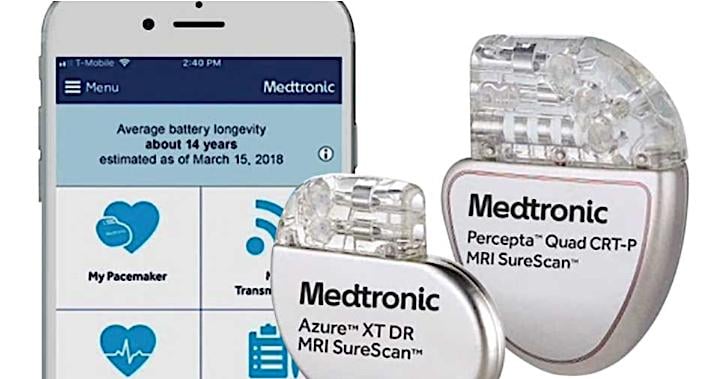
May 14, 2020 – Medtronic announced results from late-breaking clinical trials evaluating the MyCareLink Heart mobile app and the Micra Transcatheter Pacing System (TPS), products that provide needed care for patients and optimal management of their symptoms – while reducing potential exposure between patients and their clinicians. During the current COVID-19 pandemic, procedures and therapies that reduce exposure to other people are important because that also reduces the potential for spreading the virus. The results were presented at the annual Heart Rhythm Society (HRS) 2020 virtual Scientific Sessions.
Results from the BlueSync Evaluation study demonstrated that patients who used the Medtronic MyCareLink Heart mobile app (MCLH), a remote monitoring application on a patient’s phone or tablet, were more likely to adhere to their pacemaker remote monitoring schedule than patients who used traditional bedside monitors.
The study found that patients using the MCLH technology successfully completed 94.6% of scheduled transmissions, which was superior to all three Medtronic bedside monitor control groups (whose results ranged from 56.3% to 87.1%).
Higher patient adherence to scheduled transmissions of remote monitoring suggests that patients who use the MCLH app are more likely to benefit from remote monitoring than those with low or no adherence to remote monitoring.
Numerous peer-reviewed, published studies have demonstrated the benefits of remote monitoring; it has been shown to:
• Provide earlier detection and evaluation of patient clinical and device related
events[1-4];
• Reduce in-person clinic visits with no change in patient safety;[5-8]
• Improve patient quality of life;[9-11] and
• Be associated with improved long-term patient survival.[12-14]
Medtronic introduced the world’s first remote cardiac monitoring system in 2002, and it has been embraced by two million patients worldwide. Because remote monitoring helps limit in-person contact between patients, caregivers and physicians, it potentially reduces exposure to bacteria and viruses, including the virus that causes COVID-19.
“Remote monitoring for cardiac health is associated with better patient outcomes and is playing an important role in the care of patients during the COVID-19 pandemic as inperson clinic visits are restricted, ” said Rob Kowal, M.D., Ph.D., chief medical officer of the Cardiac Rhythm and Heart Failure division, which is part of the Cardiac and Vascular Group at Medtronic. “These findings are very promising for this first-of-its-kind technology, suggesting patients using this app-based approach are more likely to successfully transmit the important remote cardiac device data that physicians need to manage their patients.”
Micra TPS CED Study
Results from the Micra Coverage with Evidence Development (CED) Study showed that patients implanted with a Micra TPS experienced a 66% reduction in chronic complications at six months compared with patients who received a traditional transvenous VVI pacemaker (TV-VVI). These results provide the first insight into the real-world comparative effectiveness of Micra TPS in the Medicare population, and represent the largest evaluation of leadless pacemakers to date.
“These results show that Micra’s lower likelihood of complications in earlier clinical trials is being maintained in real-world practice,” said Jonathan P. Piccini, M.D., associate professor of medicine and director of cardiac electrophysiology at Duke University Medical Center.
Approved by the FDA in 2016, the Micra TPS is the first and only leadless pacemaker option available globally. Micra does not require leads or a surgical "pocket" under the skin, so potential sources of complications related to leads and pockets are eliminated – which may reduce in-office or hospital visits, an important consideration during this pandemic.
Find links to all the Heart Rhythm Society 2020 Late-Breaking Clinical Trials in Electrophysiology
For more information: www.medtronic.com
References:
1. Circ Arrhythm Electrophysiol. 2010;122:325-332.
2. J Am Coll Cardiol. 2011;57:1181-1189.
3. J Med Internet Res. 2013;15(8):e167
4. Circ Arrhythm Electrophysiol. 2010;3:428-436
5. Eur Heart J. 2014;35:98–105.
6. Circulation. 2010;122:325-332.
7. Eur Heart J. 2012;33:1105–1111.
8. Eur Heart J. 2013;34: 605–614
9. Eur Heart J. 2014;35:98–105.
10. Circulation. 2012;125:2985-2992.
11. Eur Heart J. 2012;33:1105–1111
12. Circulation. 2010;122:2359-2367
13. J Interv Card Electrophysiol. 2016:46(2):129-36
14. J Am Coll Cardiol. 2015;65:2601-2610.


 January 05, 2026
January 05, 2026 









